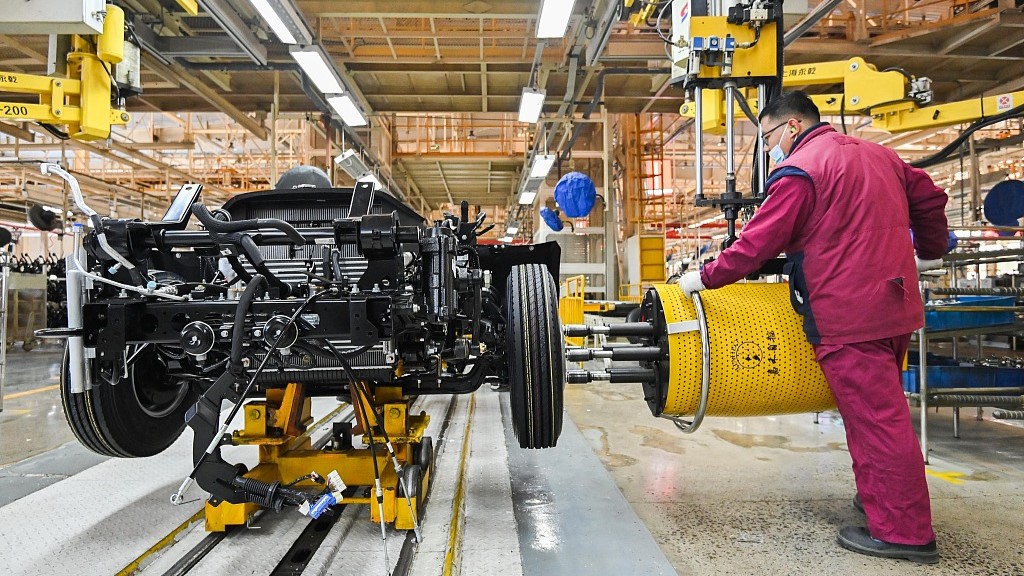
A worker operates at a car plant in east China's Shandong Province, January 31, 2023. /CFP
A worker operates at a car plant in east China's Shandong Province, January 31, 2023. /CFP
Editor's note: Bruce Pang, the chief economist and head of research at JLL Greater China, wrote the following opinion piece to comment on a meeting of the Political Bureau of the Communist Party of China (CPC) Central Committee on Friday that analyzed China's current economic situation and economic work. The article has been translated and edited for brevity and clarity. It reflects the author's opinions and not necessarily the views of CGTN.
The Political Bureau of the Communist Party of China (CPC) Central Committee has stressed that the "triple pressures" (shrinking demand, disrupted supply, and weakening expectations) that the Chinese economy is facing are now eased, economic growth has been "better than expected," and reiterated that, in the short-medium term, "China's endogenous economic growth is not strong, and demand still insufficient." In the medium-to-long term, "the economic transformation and upgrading are facing new headwinds, and many difficulties and challenges still need to be overcome to promote high-quality development."
In terms of "accelerating the construction of a modern industrial system supported by the real economy," it is timely that the development of new energy vehicles and general artificial intelligence were mentioned. The political bureau in the meeting emphasized that "recovery and expansion of demand is the key to the sustained recovery of the current economy," reiterated that "proactive fiscal policy should be more effective, prudent monetary policy should be precise and powerful to form the resultant force that expands demand," and gave specific policy guidance: "increase the income of urban and rural residents through multiple channels, improve the consumption environment, promote the consumption of cultural tourism and other services. The government will give full play to the guiding role of government investment and policy incentives to effectively stimulate private investment."
In terms of reform, opening-up and development, the meeting continued to call for unswerving adherence to the "two principles," "all types of enterprises should operate in accordance with the law," and "comprehensively deepen reform and expand high-level opening up."
It is worth noting that in terms of effectively preventing and defusing risks in key areas, the meeting reiterated the government's stance of "housing is for living in; and not for speculation," "implementing city-specific policies to promote steady and healthy development adopting city-specific policies to ensure the inelastic and improved demand for housing" "ensuring the delivery of housing, people's livelihood and stability," "promoting the steady and healthy development of the real estate market and promote the establishment of a new development model for the real estate industry," and "strengthening the management of local government debt and strictly control new hidden debts."
The main new messages and proposals include the requirement to: "coordinate the reform of small and medium-sized banks, insurance and trust institutions to make insurance coverage better," "actively and steadily promote the transformation of urban villages and the construction of public infrastructure for both emergency and social use in megacities," "planning the construction of government-subsidized housing," and stressing the importance of continuing the work on the COVID-19 prevention and control."
Overall, the meeting highlighted positive changes in the macroeconomy faced with short-term challenges in terms of internal forces and effective consumer demand, and put forward long-term policy directions for economic transformation and upgrading and promoting high-quality development.
In terms of specific policies: fiscal and monetary policies did not change. The meeting's conclusions focused more on the dual engines of promoting consumption and stabilizing investment to ensure the effective stimulation and expansion of demand.
In terms of consumption, the focuses were on adhering to the principle that "consumption is a function of income levels," and to fundamentally increase people's incomes, to improve the consumption environment through various channels, and to promote consumption for certain specific industries.
In terms of investment, it was emphasized that there is a need to reverse the continuous decline in the growth of private investment and the proportion of private investment to total overall investments through government investment and policy incentives.
This is in line with the government's "two unwavering principles" which is about consolidating and developing the public sector and about encouraging, supporting, and guiding non-public sector development. This would continue to boost the confidence of business entities, to better address the insufficient overall demand and weak confidence of micro entities, and carry out more corresponding policy efforts on the demand side.